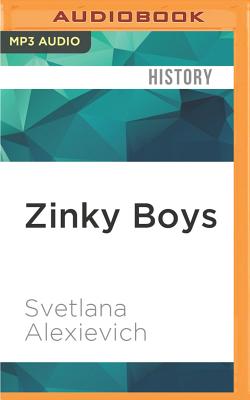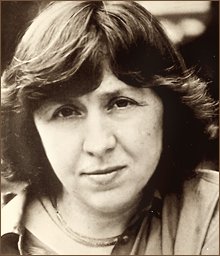

 Audible Studios on Brilliance
Audible Studios on Brilliance
Zinky Boys: Soviet Voices from the Afghanistan War


Key Metrics
- Svetlana Alexievich
- Audible Studios on Brilliance
- Audio
- 9781531873363
- 6.6 X 5.3 X 0.4 inches
- 0.15 pounds
- History > Military - Wars & Conflicts (Other)
- English
 Secure Transaction
Secure TransactionBook Description
Winner of the Nobel Prize: For her polyphonic writings, a monument to suffering and courage in our time. (Swedish Academy, Nobel Prize citation)
From 1979 to 1989 a million Soviet troops engaged in a devastating war in Afghanistan that claimed 50,000 casualties - and the youth and humanity of many tens of thousands more. Creating controversy and outrage when it was first published in the USSR - it was called by reviewers there a slanderous piece of fantasy and part of a hysterical chorus of malign attacks - Zinky Boys presents the candid and affecting testimony of the officers and grunts, nurses and prostitutes, mothers, sons, and daughters who describe the war and its lasting effects. What emerges is a story that is shocking in its brutality and revelatory in its similarities to the American experience in Vietnam. The Soviet dead were shipped back in sealed zinc coffins (hence the term Zinky Boys), while the state denied the very existence of the conflict. Svetlana Alexievich brings us the truth of the Soviet-Afghan War: the beauty of the country and the savage Army bullying, the killing and the mutilation, the profusion of Western goods, the shame and shattered lives of returned veterans. Zinky Boys offers a unique, harrowing, and unforgettably powerful insight into the realities of war. The introduction has been omitted due to rights issues.
Author Bio
I’ve been searching for a genre that would be most adequate to my vision of the world to convey how my ear hears and my eyes see life. I tried this and that and finally I chose a genre where human voices speak for themselves. Real people speak in my books about the main events of the age such as the war, the Chernobyl disaster, and the downfall of a great empire. Together they record verbally the history of the country, their common history, while each person puts into words the story of his/her own life.
Today when man and the world have become so multifaceted and diversified the document in art is becoming increasingly interesting while art as such often proves impotent. The document brings us closer to reality as it captures and preserves the originals. After 20 years of work with documentary material and having written five books on their basis I declare that art has failed to understand many things about people.
But I don’t just record a dry history of events and facts, I’m writing a history of human feelings. What people thought, understood and remembered during the event. What they believed in or mistrusted, what illusions, hopes and fears they experienced. This is impossible to imagine or invent, at any rate in such multitude of real details. We quickly forget what we were like ten or twenty or fifty years ago. Sometimes we are ashamed of our past and refuse to believe in what happened to us in actual fact.
Art may lie but document never does. Although the document is also a product of someone’s will and passion. I compose my books out of thousands of voices, destinies, fragments of our life and being. It took me three-four years to write each of my books. I meet and record my conversations with 500-700 persons for each book. My chronicle embraces several generations. It starts with the memories of people who witnessed the 1917 Revolution, through the wars and Stalinist gulags, and reaches the present times. This is a story of one Soviet-Russian soul.
Source: alexievich.info
Videos
No Videos
Community reviews
Write a ReviewNo Community reviews